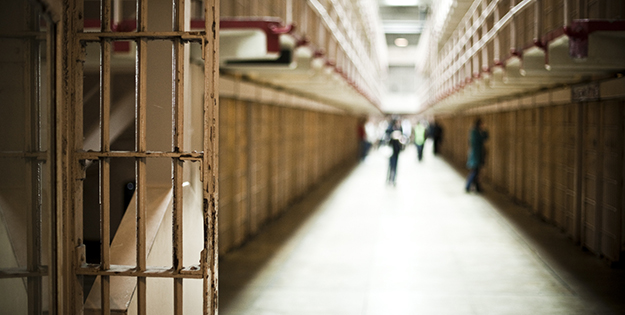Community
Copyright@ Australian Catholic University 1998-2024 | ABN 15 050 192 660 CRICOS Reg: 00004G
Copyright@ Australian Catholic University 1998-2024 | ABN 15 050 192 660 CRICOS Reg: 00004G

Overcrowded jails are prone to violence and prisoner unrest. But research shows that prison chaplains can act as a safety valve to help relieve the pressures of incarceration.
Australia’s prisons are bursting at the seams. In 2017, the prison population reached 40,000 for the first time — its highest-ever recorded level. And the rise has continued. At last count, there were 42,102 prisoners in full-time custody, an increase of almost 40 per cent in five years.
The figures also show that for many prisoners, jails are not places of redemption; rather, they’ve been described as “reoffender factories”.
As the Victorian Ombudsman Deborah Glass recently pointed out, almost half of inmates who re-enter society end up back behind bars. “I often hear the argument that prisons keep us safe,” she wrote in the Herald Sun. “But … almost one in two prisoners commits further crime and goes back to prison — a massive cost to public safety and the public purse.”
Amidst growing calls to divert funds away from jails and into rehabilitation and educational programs, our state governments have been accused of being “addicted to incarceration”. And with plans to expand or build new prisons afoot in most Australian states and territories, there’s little doubt that prisoner numbers will continue to rise.
Meanwhile, prisons that are above capacity appear to be more prone to violent incidents, prisoner death and attacks on prison officers.
Prison chaplains have been shown to play a key role in easing tension between inmates.
Corrections Victoria describes the prison ministry as “a safety valve to diffuse potentially violent situations”, and ACU’s Emeritus Professor Ruth Webber, who has studied prisons in Australia and the United States, says this is backed by her research into the Catholic prison ministry. She said the presence of prison chaplains helped to reduce violence and rule-breaking among prisoners.
“No one plays up when the chaplain is there. They diffuse anger. They are extraordinarily respected and provide a calming influence on the whole prison community,” Professor Webber said.
Inmates also turned to chaplains because they were seen as a “neutral party” to which they could air grievances about the prison authorities, said Graham Hembrow, a state manager at Prison Fellowship Australia’s Queensland branch.
“Prison can be a volatile place, which we have seen recently in Western Australia, so chaplains do play a ‘safety valve’ role whereby they can often diffuse situations by better educating prisoners … about their rights,” he told Impact.
Prisons are harsh places. Even the most hardened of criminals can struggle with anxiety and depression.
“Research the world over has shown that prison itself, let alone overcrowding within a prison, has a demoralising, dehumanising and depressing effect on prisoners and quite often those who work within the prison,” Mr Hembrow said.
This is another area where the prison ministry helps to ease the burden on fragile prisoners.
Reverend Michael Binstock, a chaplain in the British prison service, told The Guardian that inmates tend to go through all kinds of emotions.
“There are those who self-harm, there are those who are suicidal,” he said. “I got a letter from a prisoner who I visited for a number of years. When he was released, he wrote to say that he regularly thought about taking his own life and that, if it wasn’t for my visits, he would have attempted it. Most chaplains have those stories.”

When inmates meet chaplains, they’re often “at a low point in their lives”, said Sister Mary O’Shannassy, Director of Catholic Prison Ministry Victoria.
“Many have been offended against — [they] are victims first before they commit crimes,” she said, adding that prisoners had often “dulled the pain of their life experiences with drugs and alcohol”.
“In the chaplains the residents experience the presence of a person who accepts them, respects them … and treats them with dignity.”
Mr Hembrow, who served as a chaplain in Queensland prisons for 15 years, said he’d seen many examples of how chaplaincy engagement had turned a prisoner’s life around. This includes helping inmates to “break free from drugs, abuse, poor education and mental illness and become successful husbands, fathers, business owners and even prison chaplains”.
“We’ve all heard the saying ‘a problem shared is a problem halved’, and this picture is no different. When a prisoner opens up to a chaplain, the chaplain listens without judgement, the chaplain empathises and offers encouragement and often guidance,” he said.
“I have been able to show many prisoners that there is hope for them and their futures, that they do have worth and value as human beings, and that they can make a contribution to society which can impact millions.”
Professor Webber’s 2014 study, I was in prison … A window into the prison ministry, noted a common criticism of chaplains: that they see their role as trying to convert others to their faith. But she found no evidence of this in the Catholic prison ministry.
While the attempted conversion of inmates may have been commonplace in the past, nowadays chaplains offer pastoral care to prisoners when requested, regardless of their crime, culture, race or religion.
Professor Webber said some prisoners found or rediscovered faith through their contact with chaplains, while others would simply attend religious services to relieve boredom or view chaplains as just someone to talk to.
For those who discovered religion “during the darkness of their incarceration”, chaplains were “more than willing to assist them in their faith journey”, said Mr Hembrow, an ACU graduate in Theology.
“Chaplaincy is primarily focused on the pastoral care and wellbeing of the prisoner, with the faith aspect mostly following on as a result of the care and kindness shown by the chaplain,” he said.
He added that some other inmates made it clear they did not want to “be saved”, either in a religious sense, or from their incarceration itself, preferring to stay in prison.
“There are some that do not wish to be rehabilitated, as this leads to release and after spending so many years in prisons … this is a very traumatic experience.”
While there is no doubt that chaplains of many religious persuasions play an integral role in the lives of inmates, academic research on the effect they have at reducing reoffending rates is inconclusive.
Sister Mary O’Shannassy said prisoners faced many challenges on re-entering society.
“A significant number are homeless before they go to prison and they frequently tell us, ‘I have to go back to the streets as I have nowhere else to live’,” she said. “This can lead to more crime to survive and eventually a return to prison.”
Professor Webber’s research does, however, show that chaplains can assist prisoners to reintegrate into the community by helping them to maintain family ties and a sense of hope.
In Mr Hembrow’s experience, prisoners who discover faith while incarcerated often do better at reintegrating because they find a caring community that “transcends the prison walls”.
But despite all the benefits of the prison ministry, state governments seem unwilling or unable to throw significant funding into chaplaincy programs, and the general public’s sympathy for prisoners still appears to be low.
Mr Hembrow argued this was mostly due to “a fear of the unknown and a lack of education”.
“Most people believe prison is like it is in the movies,” he said. “The way to turn this around is to educate the community about prison … to dispel the myths, and to engage, equip and empower Christians to become chaplains or to enter into prison ministry.”
Ruth Webber is an Honorary Professor at ACU with degrees in sociology, psychology and education.
Graham Hembrow is the State Manager of Prison Fellowship Australia’s Queensland branch. He graduated from ACU with a Bachelor of Theology.
Copyright@ Australian Catholic University 1998-2024 | ABN 15 050 192 660 CRICOS Reg: 00004G